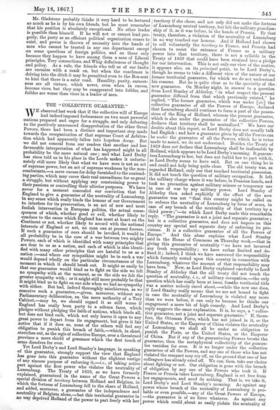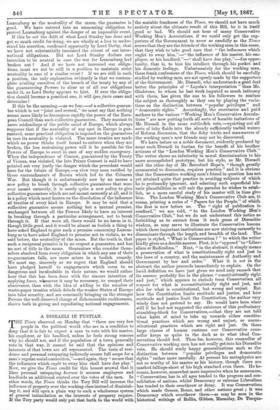THE " COLLECTIVE GUARANTEE."
Yet Lord Derby's and Lord Stanley's language, in speaking of this guarantee, strongly support the view that England has gone into this guarantee without the slightest vestige
ef any sincere purpose of enforcing of taking active part against the first power who violates the neutrality of Luxemburg. The Treaty of 1839, as we have formerly explained, guaranteed in the name of the Great Powers a special division of territory between Holland and Belgium, in which the fortress of Luxemburg fell to the share of Holland, and added, moreover, a guarantee of the independence and neutrality of Belgium alone,—but this territorial guarantee in zin way deprived Holland of the power to part freely with her
territory if she chose, and not only did not make the fortress of Luxemburg neutral territory, but left the military guardian- ship of it, as it was before, in the hands of Prussia. By that treaty, therefore, a violation of the neutrality of Luxemburg in no way touched our honour. And if Holland had chosen to sell voluntarily the territory to France, and Prussia had chosen to resist the entrance of France as a military power into that territory, there is not a syllable in the Treaty of 1839 that could have been strained into a pledge for our intervention. This is not only our view of the matter, it appears also, on its principal point, to be Lord Derby's, though he seems to take a different view of the nature of our former territorial guarantee, for which we do not understand his reasons. But he is quite clear as to the speciality of the, new guarantee. On Monday night, in answer to a question from Lord Stanley of Alderley, " in what respect the present guarantee differed from that which previously existed," he replied, " The former guarantee, which was under [sic] the collective guarantee of all the Powers of Europe, declared that Luxemburg should continue to form. a part of the posses- sions of the King of Holland, whereas the present guarantee, which is also under the guarantee of the collective Powers, declares that territory shall be neutralized." We have our doubts about this report, as Lord Derby does not usually talk bad English ; and how a guarantee given by all the Powers can be under the guarantee of all the Powers, which he is twice made to assert, we do not understand. Besides, the Treaty of 1839 does not declare that Luxemburg shall be inalienable by Holland, which appears to be Lord Derby's meaning. It guaran- tees Luxemburg to her, but does not forbid her to part with it, as Lord Derby seems to have said. But on one thing he is and could not help being quite clear. The old treaty was, as regarded Holland, only one that touched territorial possession. It did not touch the question of military occupation. It left the military charge where it was before, in Prussian hands, and took no precaution against military seizure or temporary use in case of war by any military power. Lord Stanley of Alderley then asked explicitly if the effect of the new guarantee was not " that this country might be called on to enforce the neutrality of Luxemburg by force of arms, in case of any breach of the neutrality of that territory by a third power ;"—to which Lord Derby made this remarkable reply. "The guarantee is not a joint and separate guarantee ; but is a collective guarantee, and does not impose on this country any special and separate duty of enforcing its pro- visions. It is a collective guarantee of all the Powers of Europe." And this alone explains what Lord Stanley said in the House of Commons on Thursday week,—that in giving this guarantee of neutrality " we have not incurred any fresh responsibility ; we have rather limited and de- fined it ; indeed, I think we have narrowed the responsibility which formerly rested upon this country in connection with Luxemburg, whatever the amount of that responsibility may have been." Now, as Lord Derby explained carefully to Lord Stanley of Alderley that the old treaty did not touch the question of neutrality, i. e., of military occupation,—the only question which has really been at issue, fonthe territorial title was a matter nobody cared about,—while the new one does, if Lord Stanley really means that we are not bound to fight in case the neutrality of Luxemburg is violated any more than we were before, it can only be because he thinks our engagement a mere bit of high comedy. And Lord Derby's reply suggests the same explanation. It is, he says, a " collec- tive guarantee, not a joint and separate guarantee." If, there- fore, the Ottoman Porte, which has not joined in it, or the United States, or the Emperor of China violates the neutrality of Luxemburg, we shall all be under an • obligation to punish the Porte, or the United States, or the Emperor of China. But if any of the guaranteeing Powers breaks the guarantee, then the metaphysical collectivity of the guaran- tee vanishes for ever. It is no longer under the collective guarantee of all the Powers, and any one of those who has not violated the compact may cry off, on the ground that one of her colleagues has already cried off. We can, then, take our choice about fighting or not. Our obligation is gone with the breach of obligation by any one of the Powers who took it. If France or Prussia takes Luxemburg, England is set free from her engagements, and need do nothing. That is, we take it, Lord Derby's and Lord Stanley's meaning. As against any power whose breach of the neutrality of Luxemburg is pro- bable or even possible,—any of the Great Powers of Europe, —the guarantee is of no force whatever. As against any power which could _about as easily yiolate the neutrality of Luxemburg as the neutrality of the moon, the guarantee is good. We have entered into an unmeaning obligation to protect Luxemburg against the danger of an impossible event.
If this be not the drift of what Lord Stanley has done and got so much credit for doing, we are wholly at a loss to under- stand his assertion, confirmed apparently by Lord Derby, that we have not substantially increased the extent of our inter- national obligations. Did not Lord Stanley declare our intention to be neutral in case the war for Luxemburg had broken out ? And if we have not increased our obliga- tions, must we not be still in a position to maintain strict neutrality in case of a similar event ? If we are still in such a position, the only explanation evidently is that we contem- plate availing ourselves of the breach of the treaty by any of the guaranteeing Powers to clear us of all our obligations under it, as Lord Derby appears to hint. If ever the obliga- tion should become a practical one, it will ipso facto cease and determine 1 If this be the meaning,—as we fear,—of a collective guaran- tee which is not "joint and several," we must say that nothing seems more likely to decompose rapidly the power of the Euro- pean Council than such collective guarantees. They amount to mere misleadings of the public mind of Europe, which always supposes that if the neutrality of any spot in Europe is gua- ranteed, some practical obligation is imposed on the guarantors in case its neutrality is violated. The more treaties are made which no power thinks itself bound to enforce when they are broken, the less restraining power will it be possible for the Powers of Europe to exert in case of any sudden emergency. When the independence of Cracow, guaranteed by the Treaty of Vienna, was violated, the late Prince Consort is said to have pointed out very justly the danger which the precedent would have for the future of Europe,—a view very soon verified by those encroachments of Russia which led to the Crimean War. But though it is unfortunately now by no means a new policy to break through collective guarantees that were once meant earnestly, it is surely quite a new policy to give collective guarantees which are not meant earnestly at all, and it is a policy which must hasten on the dissolution of the influence of treaties of every kind in Europe. It may be said that a collective guarantee means nothing but a mutual promise, exchanged between all the Powers likely to have an interest in breaking through a particular arrangement, not to break through it. If that were all, there would be no harm in it, though little good, and it would be almost as foolish a thing to have asked England to give such a promise concerning Luxem- burg as to have asked England to promise not to violate, as we said before, the neutrality. of the moon. But the truth is, that such a reciprocal promise is in no respect a guarantee, and has no sort of title to the name. Guarantors who consider them- selves absolved from every obligation in which any one of their co-guarantors fails, are mere actors in a foolish comedy. We must say, sincerely as we regret that England should have pledged herself to engagements which seem to us dangerous and incalculable in their nature, we would rather hear that this has been done with the sincere intention of applying force, whenever it may be necessary, to compel their observance, than with the idea of adding to the number of waste-paper treaties which delude the weaker States of Europe into false security, and are constantly bringing on the stronger Powers the well-deserved charge of dishonourable recklessness, shown both in giving and repudiating national engagements.































 Previous page
Previous page